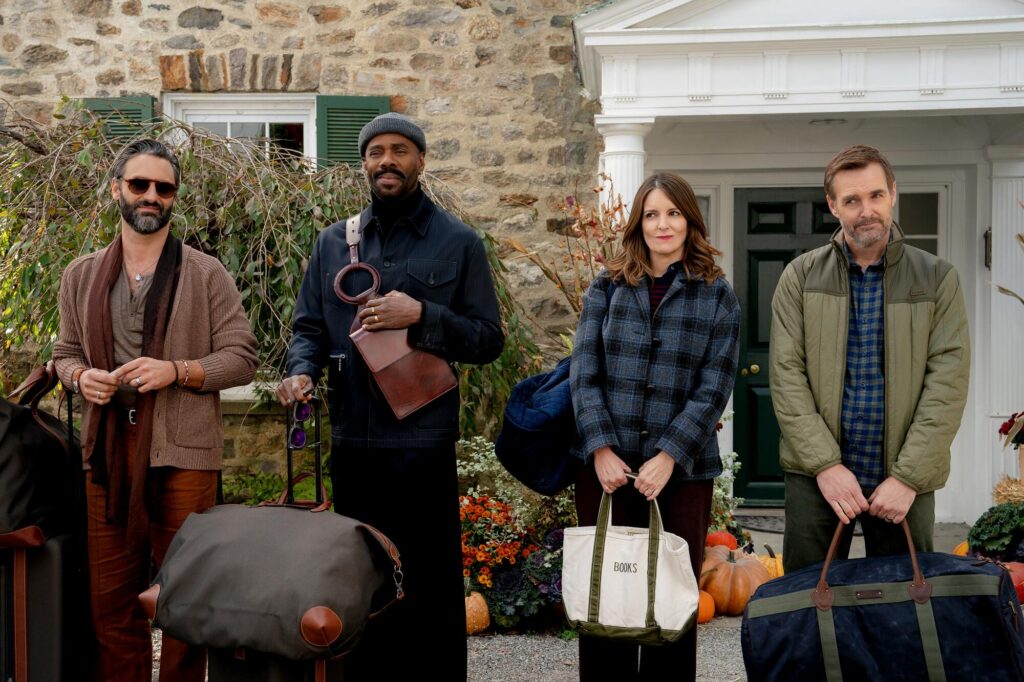Tina Fey and Will Forte are fuzzy on the details, but somewhere inside NBC Studios at Rockefeller Plaza in New York City is where, in 2002, they first crossed paths.
Fey was a few seasons into her stint on “Saturday Night Live” as a head writer and performer. And Forte was just beginning his eight-season run on the sketch comedy series.
“So much of ‘SNL’ for me is a blur,” Fey says. “Seth Meyers has this kind of encyclopedic memory of meeting everyone. He’ll be like, ‘Remember we did this …?’ And I’m like, ‘What are you talking about?’ If you ask me, I could probably remember every salad I got from Tossed or every sandwich I got from Cosi, but I can’t remember human interactions.”
“I am the exact same way,” says Forte, seated next to Fey, on a recent day in April. “Somebody asked me the other day, ‘Have you ever met the Rock?’ I’m a huge fan of the Rock. I was in an episode of ‘SNL’ with the Rock. And I just couldn’t remember.”
“‘SNL’ friendships are just this cumulative thing,” Fey says. “You’re just always around each other, all day and night. You eat family-style meals. I said to him the other day, ‘I don’t know how I know you. I just know you.”
Two decades after they entered each other’s orbit, the duo is back together, this time in “The Four Seasons,” a TV adaptation of Alan Alda’s 1981 big-screen romantic comedy of the same name. It explores the dynamics of longtime relationships — both romantic and platonic — over a year. They’ve worked together previously post-”SNL” — Forte had a recurring role in Fey’s “30 Rock” and appeared in the 2008 feature “Baby Mama,” which was headlined by Fey and Amy Poehler.
The new series, which launched Thursday on Netflix, follows three couples who are decades-long friends — Kate (Fey) and Jack (Forte), Nick (Steve Carell) and Anne (Kerri Kenney-Silver), and Danny (Colman Domingo) and Claude (Marco Calvani) — who, as they’ve settled into their lives, stay connected by vacationing together. But the dynamic shifts when Nick decides to leave Anne and begins a relationship with a younger woman, testing loyalties and aggravating weaknesses or conflicts within the other marriages. Though it’s a comedy at its heart, the story has the bittersweet candor and moments of earnestness that one might expect from characters confronting their lives at middle age.
In addition to her starring role, Fey created and wrote this reimagined version of “Four Seasons” with fellow “30 Rock” writers-producers Lang Fisher and Tracey Wigfield. Fey was a fan of the original, recalling her introduction to it during the early days of cable television when it was in heavy rotation: “There was something so aspirational and cozy about it,” she says. “One of the things I love most was it had people I loved from other things in it — Alan Alda from ‘MASH,’ Carol Burnett from ‘The Carol Burnett Show,’ Rita Moreno from ‘The Electric Company.’ My mind was blown. It was like my ‘Avengers’ universe then.” (Alda makes a cameo in the series.)
Tina Fey co-created and co-wrote “The Four Seasons” with Lang Fisher and Tracey Wigfield. From left: Claude (Marco Calvani) and Danny (Colman Domingo), Kate (Fey) and Jack (Will Forte).
(Jon Pack / Netflix)
More fundamentally, the trio of creators were invigorated by the idea of looking at the ebbs and flows of significant relationships in adulthood and how they can bloom, bend or break across different life stages.
“We wanted this to be a love letter to long marriages, to long friendships, to relationships that you’ve had for a really long time that are easy to take for granted, but are — when you look at it — the most precious thing in your life,” Wigfield says.
Kate and Jack quickly emerge as the anchor couple. They are a realistic portrayal of what it means to love someone for better and for worse … and the many annoying moments in between. There’s tenderness and frustration, playfulness and sarcasm; respect and fatigue. They seem to like each other and love each other and, just as crucially, deal with the muck of life by each other’s side.
“They hold it together,” Fey says. “They think they have got it all figured out more so than the other couples.”
“And I think that’s a lot of couples in the world,” Forte adds. “It takes very little to turn you off the path and spin you out and you have to course-correct right away or else you can spin out even further. And then it gets really tough.”
The pair are seated in a suite, fittingly, at the Four Seasons in Beverly Hills and, for a moment, they shift their focus toward the two jumbo blueberry muffins in front of them. Fey had been hyping them up all morning, Forte says as he reaches for his own.
“It’s got some compote in the middle — we may need forks to get in there,” Fey says with glee as she reaches for some. “That’s kind of what the best part is. If this interview results in me getting one free blueberry muffin, we’ve done our job.”
“Oh, my God, what is happening here?” Forte says as blueberry goo oozes out of his pastry.
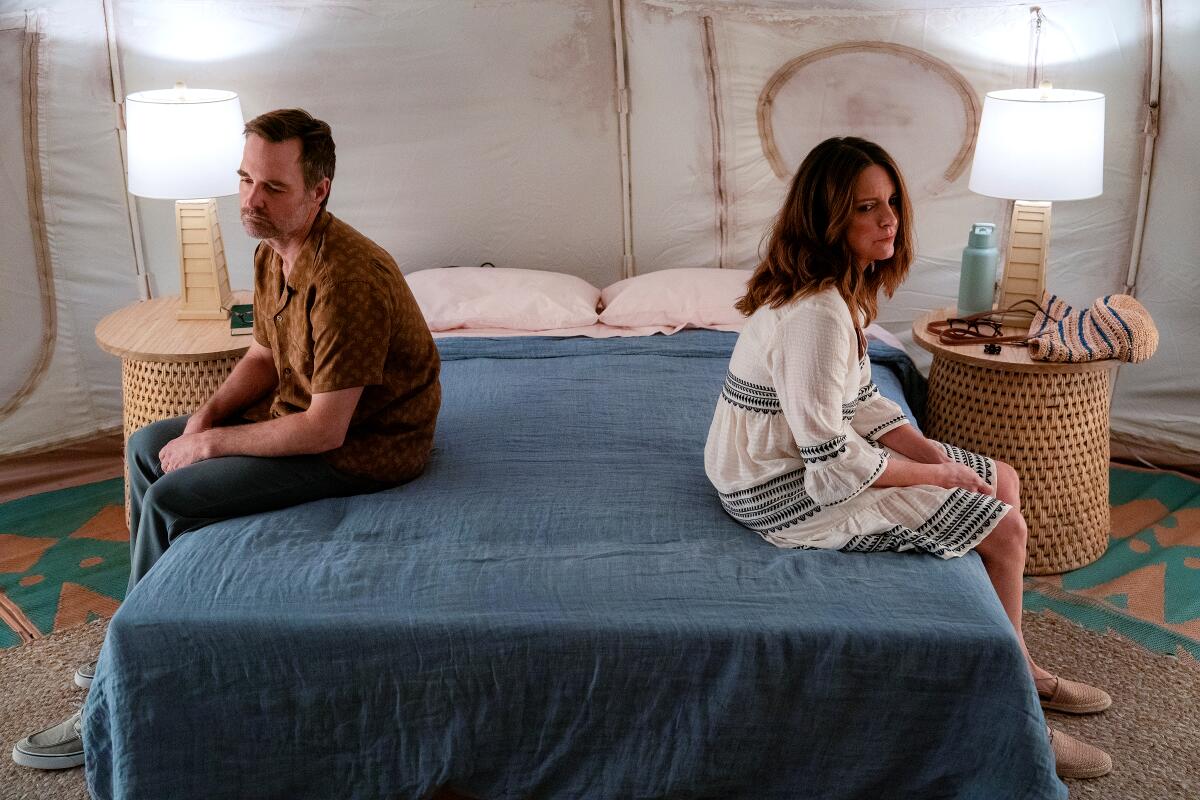
Will Forte as Jack and Tina Fey as Kate. “They think they have got it all figured out more so than the other couples,” Fey says. (Jon Pack / Netflix)
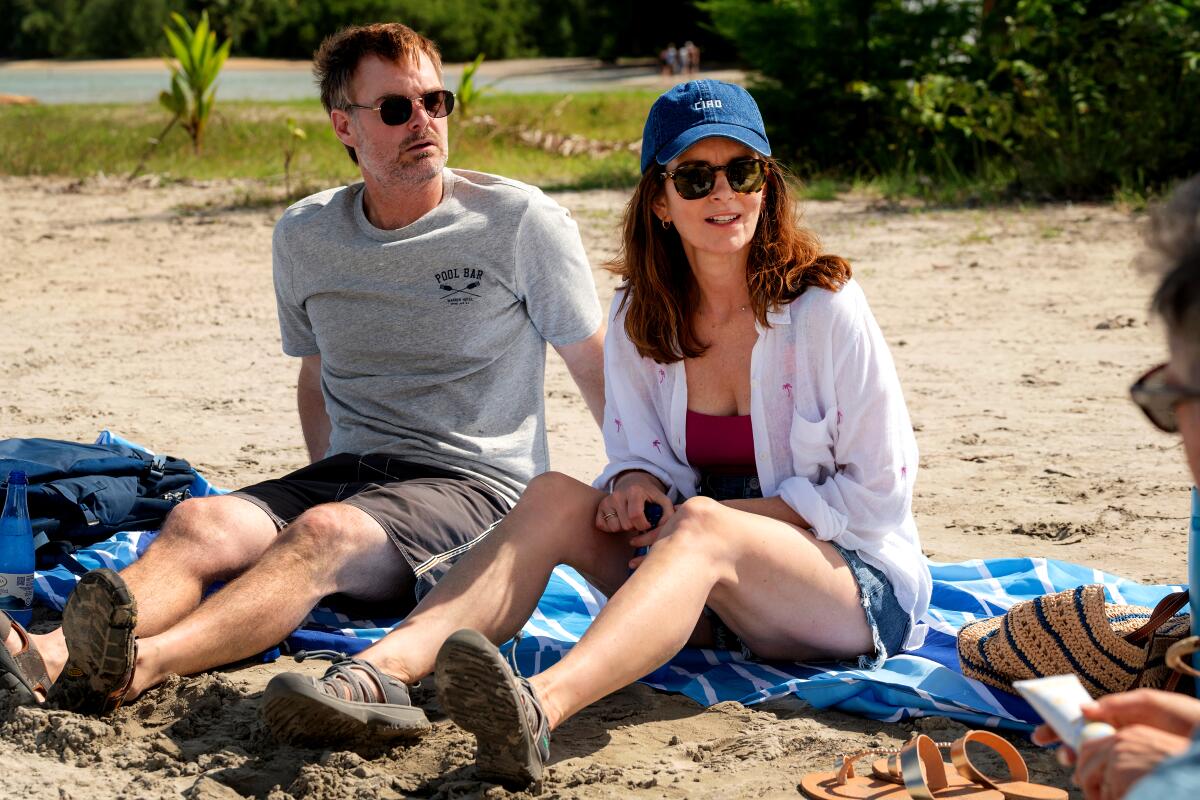
“It takes very little to turn you off the path and spin you out and you have to course-correct right away or else you can spin out even further,” Will Forte says. (Francisco Roman / Netflix )
Similarly simple but endearing slice of life details bring humorous depth to their depiction of the ordinary parts of married life within the series. There’s a moment late in the season — during a trip to visit their daughter at college — when Kate, in an attempt to do a nice gesture after an off night, makes a two-hour drive to get Jack his favorite sandwich. Only it’s not his favorite sandwich — she ordered the No. 17; he gets the No. 7. But he rolls with it, tenderly taking out the ingredients he doesn’t like (nearly all), painstakingly wiping off the condiments spread across the bread and then, after reassembling what’s left, biting into the sub sideways like a maniac as Kate watches on with disapproving marvel just as the room service he ordered, as his act of kindness, arrives. She can’t help but notice he ordered two full pitchers of juice.
It’s a moment, which happens so often in marriage, where you have good intentions, but you don’t quite get it right.
“Kate and Jack were my favorite to write,” Wigfield says. “They were also the hardest to write a little bit because we really wanted it to be a relatable story about marriage. When you’re married, it is so high stakes. It can always end in divorce. Your life could explode. But living in the day to day, it doesn’t feel like that. It’s not always people screaming all the time.”
Rather, she says it’s about patterns that play out over and over again that get bigger when they’re not addressed.
“We didn’t just want this to be, like, everyone should do what Nick did,” Wigfield adds. “We wanted this to also be about marriage[, which] is often worth fighting for, but it’s never going to be easy.”
It’s also a decidedly less intense portrayal of a weathered marriage compared with depictions like “A Marriage Story” or “Scenes From a Marriage.”
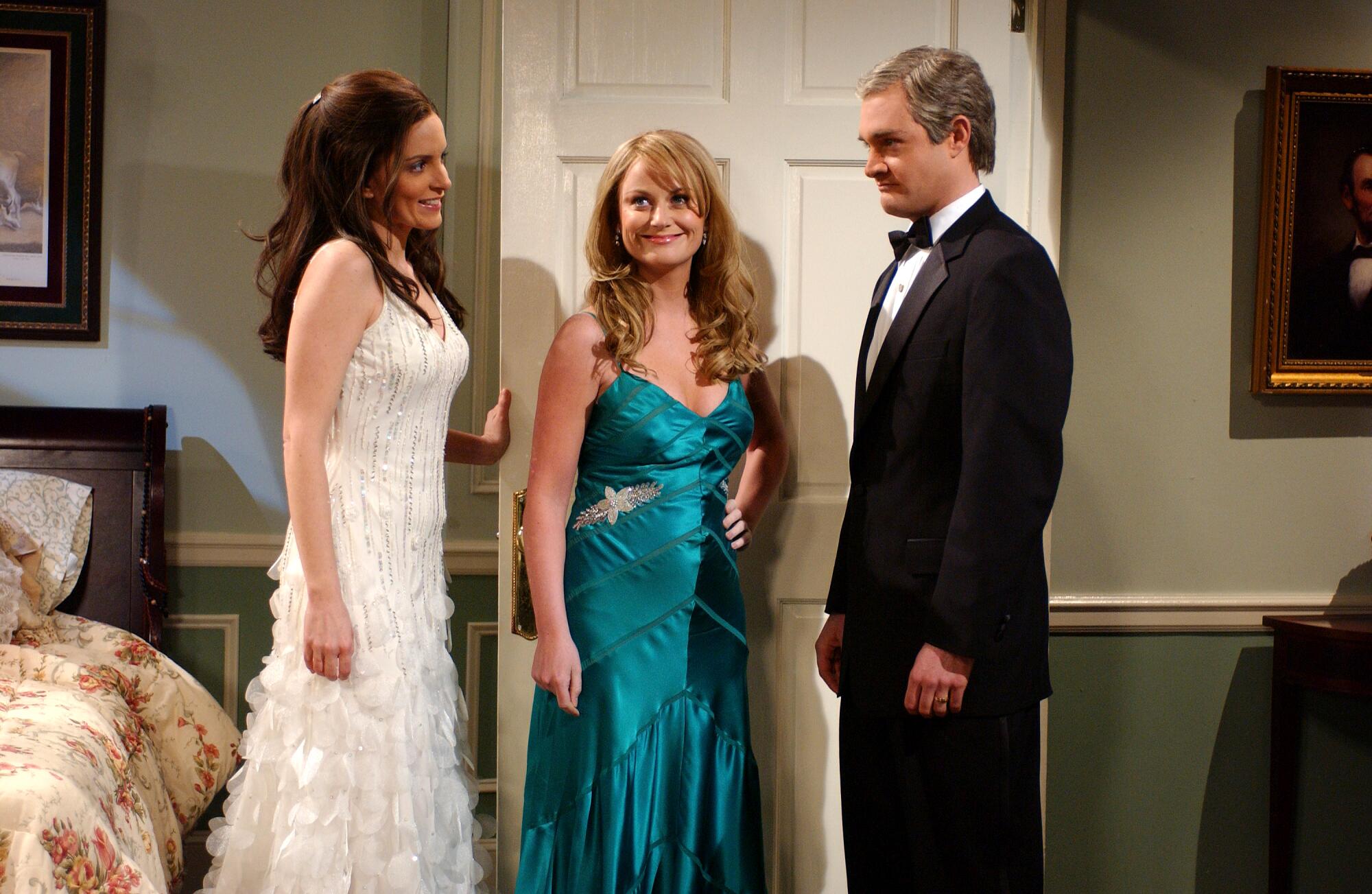
Tina Fey, left, Amy Poehler and Will Forte in a 2005 sketch on “Saturday Night Live.”
(Dana Edelson / NBCUniversal via Getty Images)
“We wanted it to be subtle and we were trying to find the right levels,” Fisher says. “Married couples get in real big fights, but a lot of times, you get in that fight and then you have to go to a kid’s play afterwards or you have to do something else; then the next day, you’re having fun together. It was about calibrating the levels of passive aggressiveness versus anger versus love.”
Fey and Forte are in different stages of their respective marriages — Fey has been married to composer and producer Jeff Richmond since 2001; Forte has been married to his wife, Olivia Modling, since 2021 — but both understand how a union can be challenged by life’s big turns and its everyday irritations.
“Through making this show, I kept saying to Lang and Tracey and the writers, ‘My character is such a bitch.’ It did make me think, ‘Am I this much of a bitch all the time? I don’t think I am. Not at home, anyway. But I do think the micro-aggressions between a couple, that kind of constant rebooting and being like, ‘sorry, let’s start over,’ that is relatable because I think there’s a real thing of just constantly making tiny mistakes that, if you don’t address in the moment, can build up to be something bad.”
“I just got married four or five years ago,” Forte adds. “It doesn’t matter how new the relationship is, everything that people go through who have been in it for 20 years, you’re going through it at year four or five. What I’ve learned is just, at every step of the way, you always have to work on it. You always have to make the decision to course-correct as early as possible. Don’t stew on things.”
That’s often easier said than done, of course. It leads Forte to acknowledge there are elements of Jack that felt like himself: “I always think I am doing the right thing and you see how that can be annoying and problematic,” he says. “I’m probably the annoying version of Jack —”
“I don’t think so,” Fey interjects. “We’ll have to ask Olivia.”
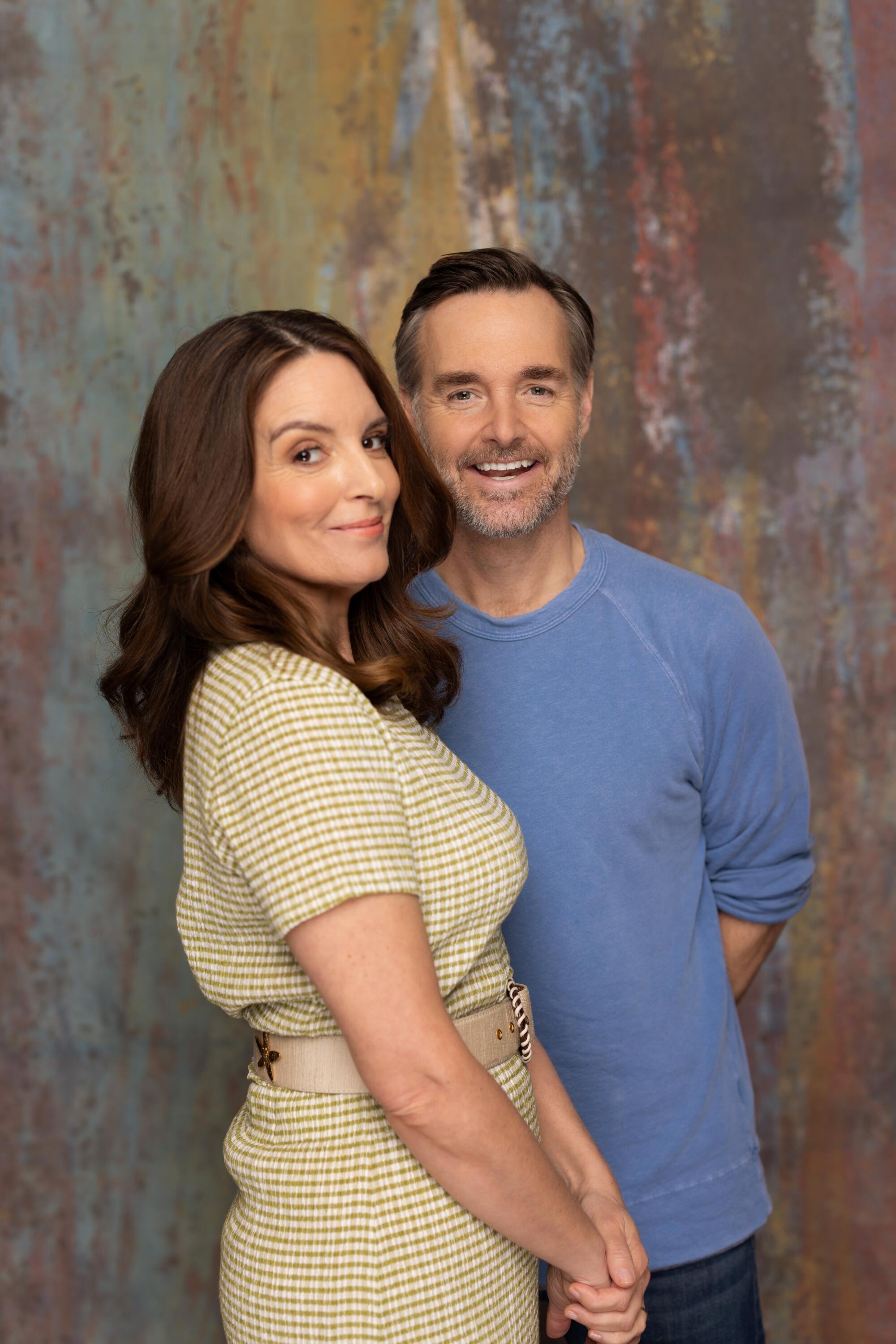
“It doesn’t matter how new the relationship is, everything that people go through who have been in it for 20 years, you’re going through it at year four or five,” Will Forte says about marriage. “What I’ve learned is just, at every step of the way, you always have to work on it.”
(Jason Armond / Los Angeles Times)
Forte says he sometimes also avoids addressing small things. He shares a hypothetical that very quickly, and funnily, seems like it’s not a hypothetical. (Olivia can set the record straight.)
“It’s that tricky thing where you’re like, ‘OK, I’m going to be honest. I don’t like it when you leave this light on all the time.’ And the next time, the light’s on. And you’re like, ‘Remember the light I talked about?’ Then the third time, it’s like ‘the light.’ Then the fourth time, it’s like, ‘What’s wrong?’ ‘Nothing,’” he explains. “You can’t really say it because I’ll get in trouble if I say, ‘that freaking light I keep talking about is on.’ But I’m still allowed to get emotionally upset about this, not being heard.”
“We have the same exact issue,” Fey interjects, referring to her marriage. “You may be making it up about the light, but my closet door, if you open it, the light comes on. And so sometimes the doors don’t close right and my husband’s like, ‘You left that light on again.’ I’m like, ‘Pull the doors close.’ I’ll be like, ‘The room that you just came out of, you left the light on and that has a light switch and you leave that light on all the time.’ He’s like, ‘No, I do not.’ He does! By the way, this is why we can’t have lights.”
“I do a million things like that too,” Forte says, ready to shoulder his faults with humor. “But, in a way, that’s my excuse to not do the things. I’ll be like, ‘Remember the light? That’s why I haven’t put my stuff in the calendar — because you keep leaving the light on.’ Then you learn to just put your stuff in the calendar and maybe the light will be off.”
“Those two things are actually unrelated,” Fey quips. “Maybe you could get a remote or a really passive aggressive clapper.”
“I’m married to a saint — she’s wonderful and a great mom. And she leaves the light on,” Forte deadpans.
The pair think it’s that kind of lightheartedness that keeps Kate and Jack intact and grounded.
“They’re one of the lucky couples who keep finding their way back to each other,” Fey says.
How’s that for a happily ever after?
Content shared from www.latimes.com.

